

New Legislation Offers Lifeline to Coastal Homeowners Facing Erosion Risks
Rodanthe is facing a wave of change with a new piece of legislation that aims to help homeowners save their properties from an imminent fall into the ocean. A bill called the Prevent Environmental Hazards Act has recently found its way into the halls of Congress, potentially offering beachfront property owners a new lifeline.
So, what exactly does this bill offer? Simply put, it allows homeowners to use federal flood insurance funds to demolish or relocate homes that are at risk of collapsing into the ocean. This proactive approach is seen as a much-needed shift in policy, especially following yet another coastal home’s dramatic plunge into the Atlantic just last month. Can you imagine living on the beach only to watch your home tumble into the sea?
This legislation has been prompted by a series of collapses in Rodanthe, part of the Outer Banks, which has some of the highest erosion rates on the East Coast. The latest incident marks the sixth home to fall in the ocean since 2020, and it highlights the urgent need for a solution. The bill is co-sponsored by North Carolina Representative Greg Murphy, whose constituents are directly affected by this issue.
What this bill does differently is it moves the focus from a reactive stance—waiting for homes to collapse—to a proactive approach. Imagine you’re a homeowner, watching as the sand slowly washes away from beneath your house. You’re probably feeling pretty helpless, right? Well, with this legislation, you could get financial support before disaster strikes. As Rep. Murphy stated, “Homeowners shouldn’t have to wait until their home has literally washed away before receiving compensation.”
But wait, there’s more! The bill doesn’t just help homeowners; it also aims to minimize the environmental impact of collapsing structures. When homes fall into the sea, they leave behind debris that can wreak havoc on marine ecosystems and coastal towns, causing cleaner-up crews to scramble for resources.
Local leader Rep. Chellie Pingree from Maine believes the legislation is essential for coastal communities, arguing that it will allow them to address coastal erosion before it becomes a catastrophic event. “It’s crucial to mitigate future climate change impacts,” she mentioned. While there is excitement about the proactive measures, questions remain regarding how quickly and efficiently this bill can be implemented.
This proposed bill is being hailed as a vital tool for local governments struggling to manage coastal erosion. Current laws limit what local officials can do to force property owners into demolishing or relocating their homes. Instead of merely twiddling their thumbs, they’ll now have a framework for addressing these problematic structures before they cause more environmental and economic distress.
Dr. Robert Young, an expert in coastal studies, pointed out that local governments don’t have many options at their disposal. “This is the first real tool they will have to get these structures off the public beach,” he remarked. And while this isn’t a magical solution to every coastal problem, it certainly lays down the groundwork for a more organized approach to erosion management.
Still, challenges loom. The bill has sparked discussions on the sustainability of beach nourishment projects and how communities might secure necessary sand for replenishment efforts given rising competition for this resource. Rodanthe and its surrounding areas have been eyeing additional beach nourishment efforts, but as the climate changes and storms become more frequent, these efforts may have to evolve.
The Prevent Environmental Hazards Act is a first step toward ensuring that coastal communities like Rodanthe can tackle the issues resulting from climate change and erosion head-on. As temperatures rise and seas climb, proactive measures take on new urgency. Will this bill be enough? Only time will tell. But for now, it’s a glimmer of hope for families facing an uncertain future at the beachfront.
If you’re affected by these changes, it may just be time to tune in to your local representatives and keep an eye on how this legislation unfolds. After all, you might just want to keep your toes in the sand—rather than looking down at ocean waves nibbling at your front porch!
News Summary The Federal Reserve, under Chairman Jerome Powell, is adopting a cautious approach to…
News Summary California, led by Governor Gavin Newsom and Attorney General Rob Bonta, is suing…
News Summary The US Department of Homeland Security has threatened to ban foreign student enrollments…
News Summary Victor Martinez-Hernandez was convicted for the murder of Rachel Morin, a mother of…
News Summary Locals Seafood has opened a new market and processing facility in East Raleigh,…
News Summary Rodanthe, North Carolina, is facing severe coastal erosion, leading to homes being washed…